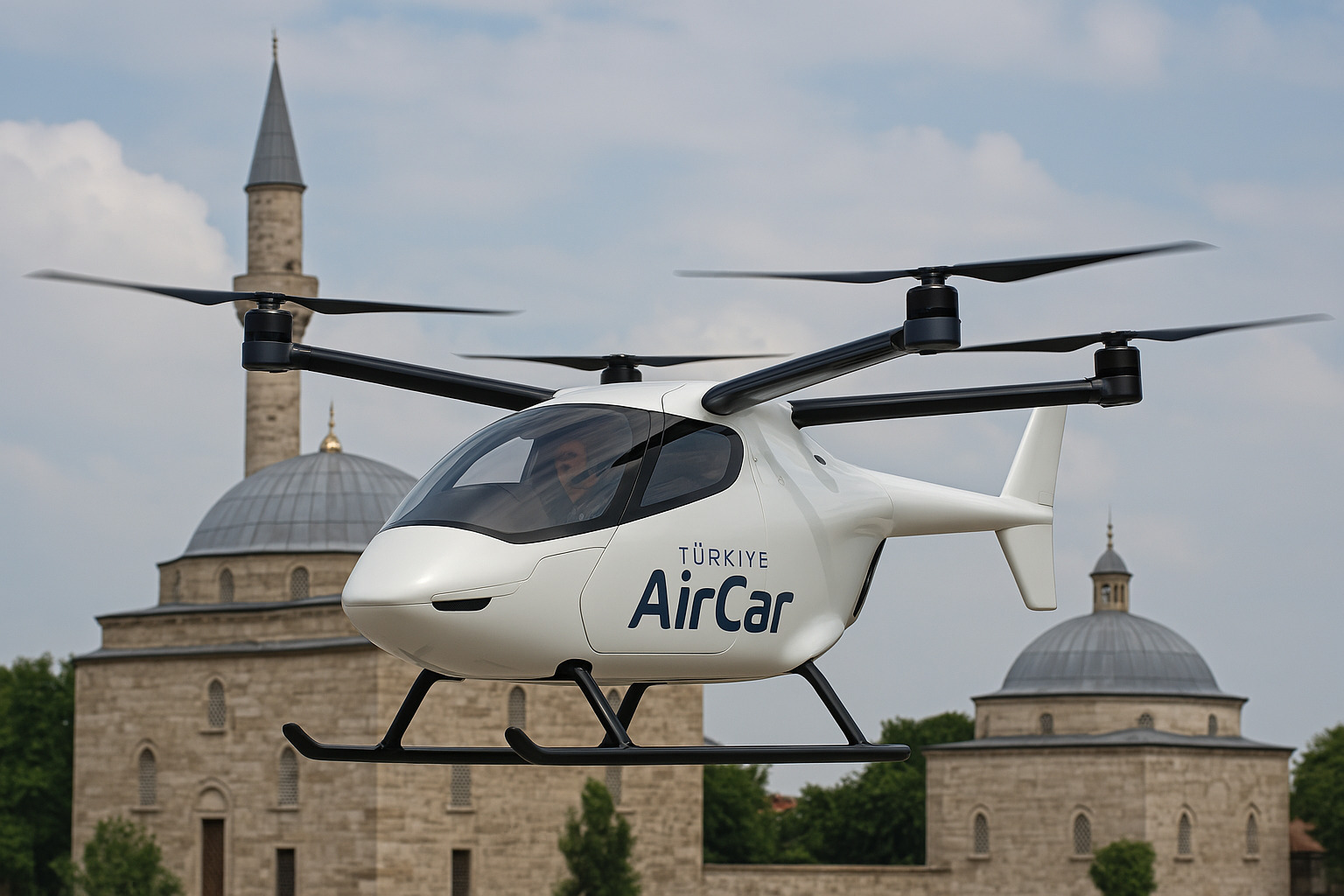Türkiye’s first domestic flying car, AirCar, completes its inaugural manned flight, marking a significant milestone in urban air mobility and technological innovation.
Türkiye’s First Domestic Flying Car: AirCar Soars into the Future of Urban Mobility
Introduction: A New Era Takes Flight
In a remarkable leap towards futuristic transportation, Türkiye has unveiled its first domestically developed flying car, the AirCar. This groundbreaking achievement not only showcases the nation’s commitment to technological advancement but also positions Türkiye as a formidable player in the emerging field of urban air mobility. Developed by the innovative startup AirCar, the vehicle recently completed its inaugural manned flight, signaling a transformative moment in the country’s aviation history.
The Genesis of AirCar: Vision Meets Innovation
The AirCar project was conceived and brought to fruition by Eray Altunbozar, an electrical and electronics engineer who, after completing his education in the United States, returned to Türkiye with a vision to revolutionize transportation. Establishing his workshop in Bilişim Vadisi (Informatics Valley), Kocaeli—a hub for technological innovation—Altunbozar embarked on a seven-year journey to develop a viable flying car. His dedication culminated in the creation of the AirCar, a vehicle that blends cutting-edge technology with practical design to address the challenges of urban congestion and mobility.
Technical Specifications: Engineering the Future
The AirCar is an electric vertical take-off and landing (eVTOL) aircraft designed for short-distance urban travel. Key technical features include:
- Seating Capacity: Two passengers
- Range: 50–80 kilometers on a single charge
- Payload Capacity: 200 kilograms
- Propulsion: Eight electric motors
- Noise Level: Five times quieter than traditional helicopters
- Flight Altitude: Tested at 8 meters during initial flights
- Flight Duration: Approximately 10 minutes under wind speeds exceeding 35 km/
Notably, the AirCar boasts 85% domestically sourced components, underscoring Türkiye’s growing capabilities in advanced manufacturing and engineering.
Milestone Achievement: The First Manned Flight
On April 5, 2025, the AirCar achieved a significant milestone by completing its first manned flight at Bilişim Vadisi. Piloted by CEO Eray Altunbozar himself, the flight demonstrated the vehicle’s stability, control, and safety features under real-world conditions. This accomplishment places AirCar among a select group of companies worldwide that have successfully conducted manned flights with eVTOL aircraft.
Strategic Vision: Integrating AirCar into Urban Landscapes
AirCar’s strategic vision extends beyond mere technological demonstration. The company aims to integrate its flying vehicles into urban transportation networks, offering solutions for both passenger travel and cargo delivery. Potential applications include:
- Urban Commuting: Reducing travel time across congested cityscapes.
- Island Connectivity: Providing efficient transport to areas like the Princes’ Islands.
- Emergency Services: Facilitating rapid response in hard-to-reach locations.
- Tourism: Offering aerial tours and unique travel experiences.
The company envisions establishing AirCar Ports across major cities, enabling point-to-point flights that could revolutionize urban mobility.
Comparative Landscape: AirCar vs. Global Counterparts
While several companies worldwide are developing eVTOL aircraft, AirCar distinguishes itself through its emphasis on domestic production and adaptability to Türkiye’s unique urban environments.
| Feature | AirCar (Türkiye) | Joby Aviation (USA) | Volocopter (Germany) |
|---|---|---|---|
| Seating Capacity | 2 | 4 | 2 |
| Range (km) | 50–80 | 240 | 35 |
| Top Speed (km/h) | 120 | 320 | 100 |
| Noise Level | Low | Low | Low |
| Production | 85% Domestic | Mixed | Mixed |
This comparison highlights AirCar’s competitive positioning, particularly in terms of domestic production and suitability for short-range urban travel.
Regulatory and Infrastructure Considerations
The integration of flying cars into urban environments necessitates the development of regulatory frameworks and infrastructure. Key considerations include:
- Air Traffic Management: Developing systems to manage low-altitude urban air traffic.
- Safety Standards: Establishing protocols for vehicle certification and operation.
- Infrastructure Development: Constructing vertiports and charging stations.
- Public Acceptance: Educating the public on the safety and benefits of urban air mobility.
Collaboration between government agencies, private companies, and international bodies will be crucial in addressing these challenges.
Economic and Environmental Impacts
The successful deployment of AirCar could have significant economic and environmental benefits:
- Economic Growth: Stimulating the domestic aerospace industry and creating high-tech jobs.
- Reduced Congestion: Alleviating traffic in densely populated urban areas.
- Lower Emissions: Decreasing reliance on fossil fuels through electric propulsion.
- Tourism Enhancement: Offering novel experiences to attract tourists.
These impacts align with Türkiye’s broader goals of sustainable development and technological innovation.
Future Outlook: Scaling Up and Global Expansion
AirCar plans to commence mass production by the end of 2025, with the establishment of manufacturing facilities to meet anticipated demand. The company also aims to explore international markets, positioning Türkiye as a key player in the global urban air mobility sector.
Continued investment in research and development, coupled with strategic partnerships, will be essential in scaling operations and achieving long-term success.
Conclusion: Türkiye’s Ascent in Aviation Innovation
The development and successful testing of the AirCar mark a significant milestone in Türkiye’s journey towards becoming a leader in next-generation transportation technologies. By harnessing domestic talent and resources, the country is not only addressing its own mobility challenges but also contributing to the global evolution of urban air travel.Türkiye Today
As AirCar moves from prototype to production, it symbolizes the potential of visionary thinking and technological prowess to reshape the future of mobility.
Call to Action:
Are you excited about the future of urban air mobility? Share your thoughts on Türkiye’s AirCar and the potential of flying cars in transforming our cities. Stay tuned for more updates on this groundbreaking innovation.
Also read post on Amazon AI Zone in Saudi Arabia


0 Comment